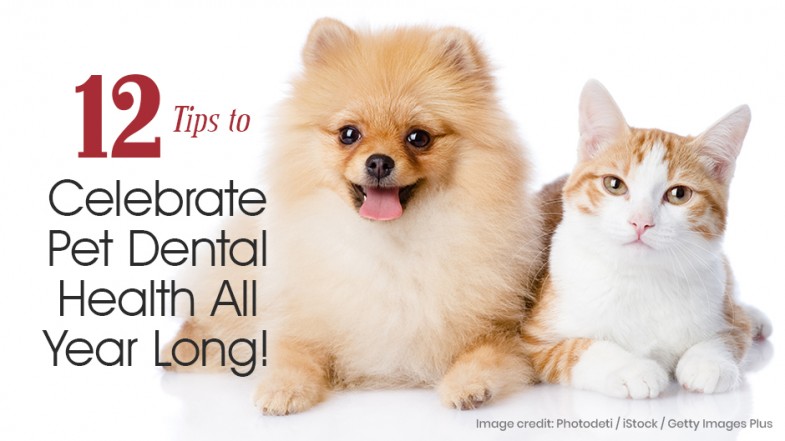Magnolia Veterinary Hospital News
12 Tips to Celebrate Pet Dental Health All Year Long!

Here is a fact we hope you’ll sink your teeth into: preventing periodontal disease (also known as gum disease). By protecting your pet’s dental health, you can extend their life by three years! Along with obesity, dental disease is a leading (and preventable) illness that takes the lives of far too many pets far too early. To make matters even more pressing, over 80% of dogs and 50% of cats over the age of three will develop periodontal disease.
Here’s another fact: February is National Pet Dental Health Month. But we feel 28 days just isn’t long enough. We want this holiday to last a whole year, so we challenge you to try out all 12 of these dental tips over the course of the next year!
1. Schedule Your Pet’s Dental Cleaning
When your pet comes in for a cleaning, we’ll scrape away those years of tartar and rinse your pet’s teeth for an improved clean you can see (and smell). We will also let you know if your pet has any dental issues that need to be addressed with follow-up care.
2. Follow Up After Your Pet’s Dental Cleaning
Broken, worn away, and damaged teeth can cause your pet extensive pain and discomfort. If we recommend a tooth extraction or another dental operation, be sure to schedule the appointment and ask any questions before you leave our office. Most importantly, be sure to keep your appointment.
3. Make Dental Hygiene Fun with Toys!
There are so many toys available now that support your pet’s dental health while they chew and play. Adding a few of these toys to your pet’s playtime can support better dental health in the long run.
4. Dental Care Can Be Tasty
Along with toys designed to scrape away plaque, dental treats can also assist your pet in their dental health journey. Don’t forget to ask your pet to “sit” and “stay,” so they feel like they’re really earning these fun and tasty treats.
5. Water Additives Work
While your dentist recommends you use mouthwash, we recommend water additives made to loosen plaque and destroy oral bacteria. Most are just a capful per water bowl, and they work by making other dental approaches more effective.
6. Know the Signs of Dental Disease and Discomfort
Pets can speak, but they can tell us when their mouths hurt. If you notice your pet
- refraining from eating
- pawing their mouth
- favoring a side of the mouth while eating
- whining while eating or playing
your pet may be suffering from oral pain.
You also want to look for signs of dental disease or damage that require a visit to see us including
- Red, swollen, or bleeding gums
- Discoloration along the gumline
- Bumps or sores around the mouth and jaw
- Broken teeth
- Bad breath
- A tooth disintegrating (in cats)
- Blood on toys
- Loose teeth
- Extra or stringy saliva
- Avoiding having the mouth being touched
- A runny nose
7. Switch Your Pet’s Food
Your pet’s diet can benefit their dental health. A high-quality diet or dental food can help clean your pet’s teeth as they eat.
8. Use Dental Wipes
We know that many pets refuse to have their teeth brushed, and it’s easy to give up on the battle when your pet puts up a fight. Dental wipes can be an alternative that may not be 100% as effective as brushing, but they do help.
9. Start Brushing Your Pet’s Teeth
Use a pet-friendly toothpaste and toothbrush and commit to scrubbing those teeth each night. Encourage a positive association by starting slow and using a lot of treats!
10. Avoid Tennis Balls and Bones
While these items can offer a lot of excitement, they can also lead to broken teeth or wear away your pet’s enamel. Tennis balls can also harbor bacteria.
11. Encourage Your Pet to Drink More
Water doesn’t just prevent dehydration--it also improves your pet’s breath and dental health. Every time your pet drinks, it washes away bits of food and debris that can attract bacteria.
12. Treat Your Dog to Carrots and Celery
While you may have trouble convincing a cat to eat raw carrot or celery, your dog will love these as a treat. They’re healthy, low in calories, and you guessed it--good for their dental health.
As for your kitty, we can recommend some supplements that can help.
Don’t Delay Your Pet’s Dental Health
We hope you will dive in and get started this month and continue your pet’s dental journey all year long. Begin by making an appointment to see us now.
Categories
Recent Posts

When was the last time your pet saw the veterinarian for a checkup, not because they were sick, but just to stay healthy? Preventive care is one of the most important ways to give your pet a longer, happier life. It’s not about doing one big thing. It’s about the small, consistent steps that help avoid bigger health problems later on.

The holidays are full of sparkle, laughter, travel, and to-do lists a mile long. As joyful as this season can be, it often means busier schedules and less time for everyday routines. In the middle of the holiday rush, it's easy to overlook one very important family member: your pet.

If you're lucky enough to have a senior pet, you know just how special that bond becomes over time. From cozy afternoons on the couch to the look in their eyes that says, "I've known you forever," there’s a deep and quiet understanding between you. As pets get older, though, their needs change. Aging isn’t a disease, but it does require us to adapt how we care for our beloved companions.